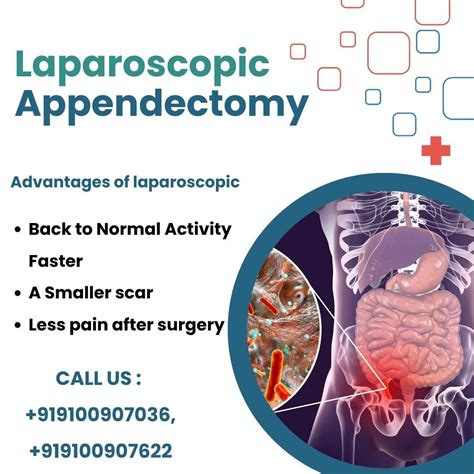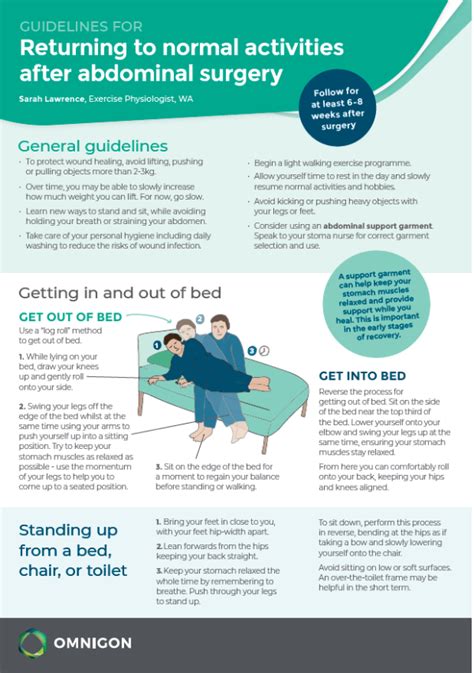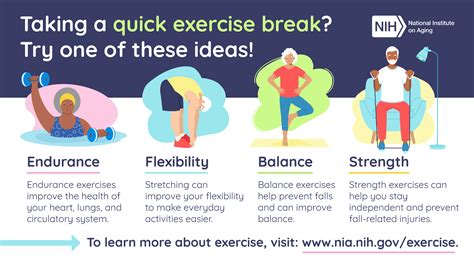Intro
Recover smoothly after appendix removal surgery. Learn about post-operative care, dietary changes, and managing symptoms for a speedy recovery and improved overall health.
The appendix is a small, tube-like structure attached to the large intestine, and its primary function is not fully understood. However, when it becomes inflamed or infected, it can cause severe abdominal pain, nausea, and vomiting. In such cases, surgical removal of the appendix, also known as an appendectomy, is often necessary to prevent further complications. If you or a loved one has recently undergone appendix removal surgery, you may be wondering what to expect during the recovery process and how it will affect your daily life.
Appendicitis, the inflammation of the appendix, is a common condition that affects millions of people worldwide. While some cases may be treated with antibiotics, surgery is often the most effective way to resolve the issue. The good news is that appendix removal surgery is a relatively common procedure, and most people can expect to make a full recovery within a few weeks. However, it's essential to follow the doctor's instructions and take necessary precautions to ensure a smooth and speedy recovery.
The recovery process after appendix removal surgery can vary depending on the individual and the type of surgery performed. Laparoscopic surgery, which involves making small incisions in the abdomen, is a minimally invasive procedure that typically results in less pain and scarring compared to open surgery. Regardless of the surgical method, it's crucial to follow a healthy diet, stay hydrated, and get plenty of rest to aid in the healing process. In the following sections, we will delve into the details of life after appendix removal surgery, including the benefits, potential complications, and tips for a successful recovery.
Understanding the Recovery Process

Post-Surgery Care
Proper post-surgery care is vital to prevent complications and promote healing. Patients are usually advised to avoid heavy lifting, bending, or strenuous activities for several weeks after the surgery. A healthy diet rich in fruits, vegetables, and whole grains can help aid in the recovery process. It's also essential to stay hydrated by drinking plenty of water and other fluids. Patients may need to take antibiotics to prevent infection and pain medication to manage discomfort.Benefits of Appendix Removal Surgery

Potential Complications
While appendix removal surgery is generally a safe procedure, there are potential complications to be aware of. These may include: * Infection or abscess formation at the surgical site * Adhesions or scar tissue formation * Bowel obstruction or intestinal blockage * Wound complications, such as dehiscence or evisceration * Reaction to anesthesia or medicationLife After Appendix Removal Surgery

Tips for a Successful Recovery
To ensure a successful recovery after appendix removal surgery, consider the following tips: * Get plenty of rest and avoid strenuous activities * Eat a healthy diet rich in fruits, vegetables, and whole grains * Stay hydrated by drinking plenty of water and other fluids * Take antibiotics or pain medication as prescribed * Attend follow-up appointments with the doctor to monitor the healing process * Avoid smoking or exposure to secondhand smoke, which can slow down the healing processReturning to Normal Activities

Managing Pain and Discomfort
Pain and discomfort are common after appendix removal surgery. However, there are several ways to manage these symptoms, including: * Taking pain medication as prescribed * Applying heat or cold packs to the affected area * Getting plenty of rest and avoiding strenuous activities * Eating a healthy diet rich in fruits, vegetables, and whole grains * Staying hydrated by drinking plenty of water and other fluidsDiet and Nutrition After Appendix Removal Surgery

Foods to Avoid
There are certain foods that patients should avoid after appendix removal surgery, including: * High-fiber foods, such as beans, cabbage, and broccoli, which can cause gas and discomfort * Spicy or fatty foods, which can irritate the stomach and cause discomfort * Carbonated drinks, which can cause gas and discomfort * Caffeine, which can interfere with sleep and cause dehydrationExercise and Physical Activity After Appendix Removal Surgery

Benefits of Exercise
Regular exercise can provide several benefits after appendix removal surgery, including: * Improved overall health and well-being * Reduced risk of complications, such as bowel obstruction or intestinal blockage * Improved mental health and mood * Increased energy levels * Enhanced immune functionWhat are the risks and complications of appendix removal surgery?
+The risks and complications of appendix removal surgery include infection, adhesions, bowel obstruction, and reaction to anesthesia or medication. However, these complications are rare and can be managed with proper medical care.
How long does it take to recover from appendix removal surgery?
+The recovery time for appendix removal surgery can vary depending on the individual and the type of surgery performed. However, most people can expect to make a full recovery within a few weeks.
What are the benefits of appendix removal surgery?
+The benefits of appendix removal surgery include relief from abdominal pain and discomfort, prevention of further complications, and improved overall health and well-being.
Can I return to normal activities after appendix removal surgery?
+Yes, patients can return to their normal activities after appendix removal surgery. However, it's essential to follow the doctor's instructions and take necessary precautions to ensure a smooth and speedy recovery.
What is the role of diet and nutrition in the recovery process after appendix removal surgery?
+A healthy diet rich in fruits, vegetables, and whole grains is essential for aiding in the recovery process after appendix removal surgery. Patients should aim to include a variety of foods in their diet and avoid high-fiber foods, spicy or fatty foods, and carbonated drinks.
In
